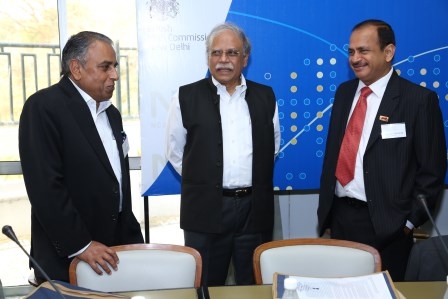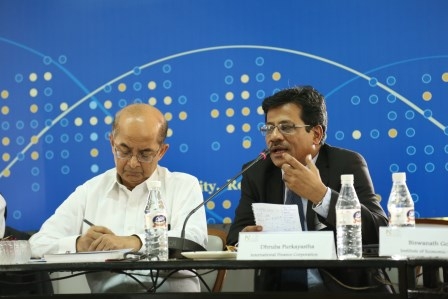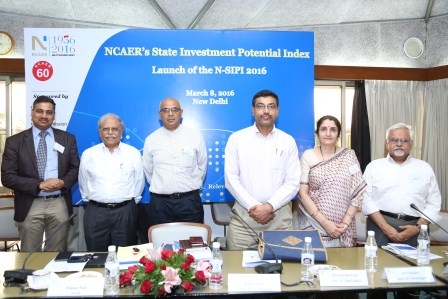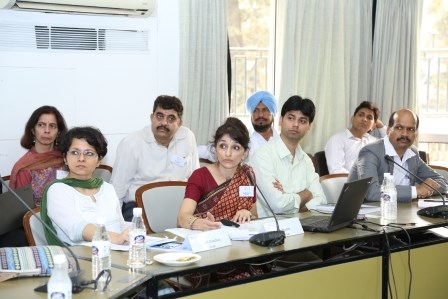The National Council of Applied Economic Research, NCAER, released a new NCAER State Investment Potential Index (N-SIPI) at a full-day launch workshop inaugurated by Ramesh Abhishek, Secretary, Department of Industrial Policy and Promotion (DIPP) in the Ministry of Commerce and Industry. Covering all 29 States and the Delhi Union Territory, NCAER will release N-SIPI in March every year as a credible yardstick of how the investment climate of India’s States is changing. Gujarat and Delhi top the list of states in 2016 on the first N-SIPI index.
India is currently the fastest growing large economy globally. These global trends and the NDA Government’s focus on creating a more friendly investment climate are expanding opportunities for doing business in India. These opportunities inevitably lie in India’s States, influenced not just by New Delhi’s policies but conditioned very much by what is happening in each State. N-SIPI measures each State’s investment climate and will track it over time. The NCAER State Investment Potential Index provides a composite indicator of how India’s States are positioned to encourage and attract investment, bridging the many information gaps surrounding questions of what, how much and where to invest. It will provide an entry point for domestic and overseas investors in thinking about their investment decisions and will also encourage a more competitive ethos among India’s States.
N-SIPI complements the policy initiatives of the Modi Government on its Make in India, Skill India, and Start-up India campaigns by helping guide potential domestic and overseas investors with relevant, high-quality data and analysis of the policy framework in each State. N-SIPI fully complements the Government of India’s initiative through DIPP to improve India’s ranking on the Ease of Doing Business Index of the World Bank. The Ease of Doing Business index is much more procedure- and transactions-driven, while N-SIPI focuses on the policy and structural backdrop that determines the business environment in any State. N-SIPI complements the work of DIPP with the States on their September 2015 assessment of how the States had implemented DIPP’s 98-point action plan to improve the ease of doing business and the resulting 340-point Business Reform Action Plan for 2016.
While launching N-SIPI, Mr Ramesh Abhishek, Secretary, Department of Industrial Policy and Promotion, observed that while the results and rankings of the NCAER report are different from the DIPP survey conducted last year, both their contents supplement each other and function as vital platforms for assessing investment potential of the states. He noted the significance of this work, highlighting the fact that the “criteria for gauging the investment potential of States used in the NCAER N-SIPI—among them, labour and infrastructure conditions, economic conditions, governance and political stability, and industry perceptions—complement the parameters that DIPP considers important for assessing the business potential of states. The NCAER Report is also significant in that it provides useful feedback from industry and business regarding the pace and implementation of reforms in the states.”
NCAER’s 2016 N-SIPI consists of two indices, N-SIPI 21 and N-SIPI 30. N-SIPI 21 covers 20 States and the Delhi Union Territory, and in addition to being based on four pillars–labour, infrastructure, economic climate, governance and political stability—fundamentally driving investment decisions, it also includes a fifth pillar comprising an extensive perception-based industry survey to capture State level differences. It comprises 51 sub-indicators, identified after discussions with industry, academics, and central and State government functionaries. N-SIPI 30 on the other hand provides national coverage of all States, covering all 29 States and the Delhi Union Territory, but excludes the perception pillar since the perception survey was not done in nine States.
As with the DIPP September assessment, Gujarat tops the list in N-SIPI 21. Gujarat is followed by Delhi and Tamil Nadu. States like Bihar, Uttar Pradesh and Jharkhand appear much lower in the rankings. If the pillar based on industry perceptions is omitted, the results, as revealed by N-SIPI 30, change significantly. Gujarat slips to second place in the modified index without the perception-based survey, while Delhi is placed at the top. States like Kerala, West Bengal and Punjab move up the rankings, while others like Andhra Pradesh, Chhattisgarh and Madhya Pradesh move down.
Dr Shekhar Shah, Director-General, NCAER, emphasized India’s place as the world’s third largest market, just behind the United States and China, and the need for India’s States to drive their investment climates to convert this market potential into business reality. He said, “With the focus of policy reforms shifting so much to the States, whether in labor reforms, in land acquisition, or in service delivery in health and education, this systematic, credible, evidence-based evaluation of the investment potential of States will be timely. We hope the work being done at NCAER on the investment climate, of which N-SIPI is the first product, will offer potential investors a reliable tool to guide their investment decisions by ranking States based on their openness to attract investment, business and entrepreneurship, and job creation potential.”
In terms of the five pillars in N-SIPI 21, Gujarat leads on governance and industry perceptions. Delhi is ahead of the others on infrastructure and economic climate. Odisha consistently occupies the top half of the bracket across all parameters, though faring better in the sphere of labour and perceptions as compared to the others.
While introducing N-SIPI, the lead author of the study and Senior Fellow at NCAER, Dr Indira Iyer, remarked, “A novel aspect of N-SIPI 21 is that the index factors in the business climate across the States as captured by a perception-based industry survey –a signature strength of NCAER for doing which it has a lot of experience. The findings of the survey reinforce the perception that corruption is the most significant impediment to business, followed by difficulties in getting approvals. Contrary to the popular perception, labour laws are not as important as the availability and quality of skilled labour.”
NCAER plans to update the index annually, so that N-SIPI, along with the World Bank’s Ease of Doing Business surveys and DIPP’s assessments of the progress made by states on their action plans, will allow both Indian and foreign investors to take informed investment decisions and, as importantly, aid the central and States governments in policy making, monitoring, and implementation.
In ending, Dr Shekhar Shah said, “N-SIPI 2016 represents a significant initiative at NCAER as part of its 60th Anniversary celebrations. It is aimed at helping fulfil the vision of India’s founding fathers and their dream of building a Union composed of competitive, inclusive, and opportunity-creating Indian States.”











